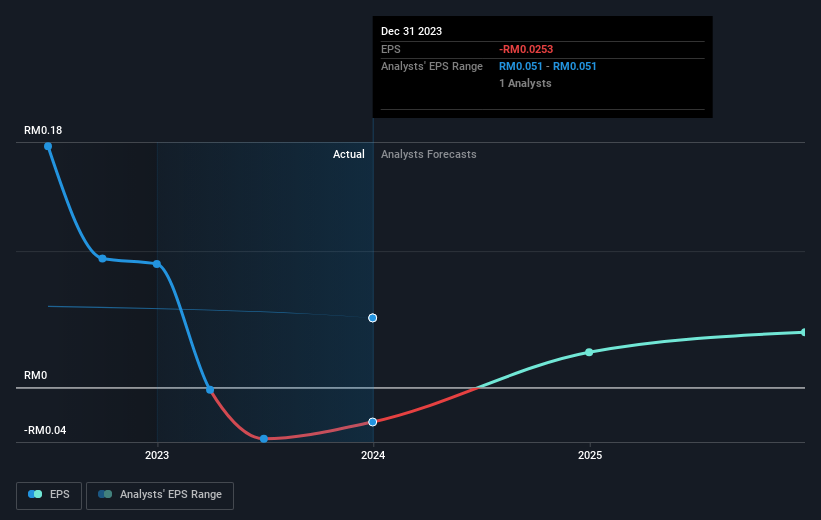- Malaysia
- /
- Semiconductors
- /
- KLSE:DNEX
The 11% return this week takes Dagang NeXchange Berhad's (KLSE:DNEX) shareholders five-year gains to 86%

Generally speaking the aim of active stock picking is to find companies that provide returns that are superior to the market average. And the truth is, you can make significant gains if you buy good quality businesses at the right price. To wit, the Dagang NeXchange Berhad share price has climbed 82% in five years, easily topping the market return of 10% (ignoring dividends). However, more recent returns haven't been as impressive as that, with the stock returning just 2.3% in the last year.
After a strong gain in the past week, it's worth seeing if longer term returns have been driven by improving fundamentals.
View our latest analysis for Dagang NeXchange Berhad
To paraphrase Benjamin Graham: Over the short term the market is a voting machine, but over the long term it's a weighing machine. One imperfect but simple way to consider how the market perception of a company has shifted is to compare the change in the earnings per share (EPS) with the share price movement.
Over half a decade, Dagang NeXchange Berhad managed to grow its earnings per share at 13% a year. We note, however, that extraordinary items have impacted earnings. This EPS growth is remarkably close to the 13% average annual increase in the share price. This indicates that investor sentiment towards the company has not changed a great deal. Rather, the share price has approximately tracked EPS growth.
The company's earnings per share (over time) is depicted in the image below (click to see the exact numbers).

This free interactive report on Dagang NeXchange Berhad's earnings, revenue and cash flow is a great place to start, if you want to investigate the stock further.
What About The Total Shareholder Return (TSR)?
We've already covered Dagang NeXchange Berhad's share price action, but we should also mention its total shareholder return (TSR). The TSR attempts to capture the value of dividends (as if they were reinvested) as well as any spin-offs or discounted capital raisings offered to shareholders. Dividends have been really beneficial for Dagang NeXchange Berhad shareholders, and that cash payout contributed to why its TSR of 86%, over the last 5 years, is better than the share price return.
A Different Perspective
Dagang NeXchange Berhad shareholders are up 2.3% for the year. Unfortunately this falls short of the market return. It's probably a good sign that the company has an even better long term track record, having provided shareholders with an annual TSR of 13% over five years. Maybe the share price is just taking a breather while the business executes on its growth strategy. You might want to assess this data-rich visualization of its earnings, revenue and cash flow.
But note: Dagang NeXchange Berhad may not be the best stock to buy. So take a peek at this free list of interesting companies with past earnings growth (and further growth forecast).
Please note, the market returns quoted in this article reflect the market weighted average returns of stocks that currently trade on Malaysian exchanges.
New: Manage All Your Stock Portfolios in One Place
We've created the ultimate portfolio companion for stock investors, and it's free.
• Connect an unlimited number of Portfolios and see your total in one currency
• Be alerted to new Warning Signs or Risks via email or mobile
• Track the Fair Value of your stocks
Have feedback on this article? Concerned about the content? Get in touch with us directly. Alternatively, email editorial-team (at) simplywallst.com.
This article by Simply Wall St is general in nature. We provide commentary based on historical data and analyst forecasts only using an unbiased methodology and our articles are not intended to be financial advice. It does not constitute a recommendation to buy or sell any stock, and does not take account of your objectives, or your financial situation. We aim to bring you long-term focused analysis driven by fundamental data. Note that our analysis may not factor in the latest price-sensitive company announcements or qualitative material. Simply Wall St has no position in any stocks mentioned.
About KLSE:DNEX
Dagang NeXchange Berhad
An investment holding company, engages in information technology (IT) and eServices, and energy businesses in Malaysia.
Reasonable growth potential with adequate balance sheet.
Market Insights
Community Narratives




